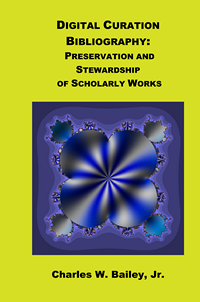Digital Scholarship has released the Digital Curation Resource Guide.
This resource guide presents over 200 selected English-language websites and documents that are useful in understanding and conducting digital curation. It covers academic programs, discussion lists and groups, glossaries, file formats and guidelines, metadata standards and vocabularies, models, organizations, policies, research data management, serials and blogs, services and vendor software, software and tools, and training. It is available under a Creative Commons Attribution-NonCommercial 3.0 Unported License.
The Digital Curation Resource Guide complements the Digital Curation Bibliography: Preservation and Stewardship of Scholarly Works, which was released in June.
It is also available as an EPUB file (see How to Read EPUB Files).

